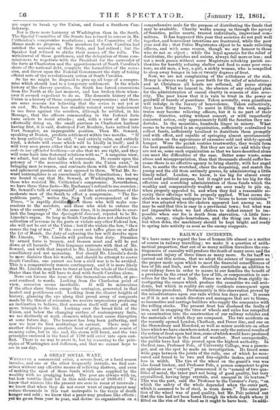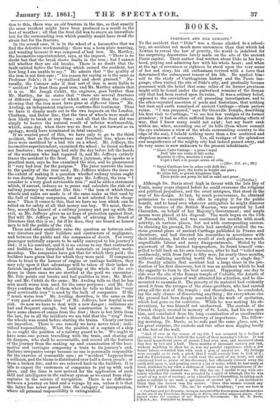RAILWAY INCIDENTS.
WE have come to regard the loss of human life almost as a matter of course in railway travelling ; we make it a question of arith- metical proportion, that out of so many million travellers the con- tingencies of casualty will produce the death of many score and the , permanent injury of three times as many more. So far hays we (s ttr,
earned out this notion, that we adopt the science of in ranee as the proper mode upon which to meet the financial eonse ences of loss of life and limb, and we cheerfully contribute an a dition to our railway fares in order to secure to our families the benefit of a provision in the event of the loss of life, or compensation to our- selves for the loss of a limb. Hence we abstain from rigidly in- vestigating the causes which produce the casualties we call acci- dents, but which in reality are only incidents consequent upon i
conditions precedent. Preeminently is this observation proved by the misadventures upon our rails within ten days past. It seems as if it is not so much directors and managers that are to blame, as locomotive and carriage builders who supply the companies with the rolling stocks. The present frost has disclosed the faults of iron, and in snapping the tires of wheels and axles has compelled an examination into the construction of our railway vehicles and the materials of which they are composed. The two accidents on the recently opened London, Chatham, and Dover line, and one on the Shrewsbury and Hereford, as well as minor accidents on other lines which we have elsewhere noted, were only the natural results of the action of frost upon bad iron, some of which would have produced mischief hereafter in the finest of weather. Most unexpectedly, the public have had this proved upon the highest authority. In the first case, Professor Pole, of University College was a passen- ger, and on the spot he made anan investigation. He found some wide gaps between the joints of the rails, one of which he mea- sured and found to be two and five-eighths inches, and several less in width. The tire of the wheel on the guard's van was also found broken, and Professor Pole, a person competent to give an opinion as an "expert," pronounced it to "consist of two qua- lities of metal, the inner part not being of good quality, but very crystallized, having large crystals, and unequal in its texture.' This was the part, said the Professor to the Coroner's Jury, "on which the safety of the whole depended when the outer part, which is assumed to be of steel, is worn down." The outer por- tion of the wheel was of good quality, but Mr. Pole pointed out that the tire had not been bored through its whole depth where it fitted on the rim of the wheel as it ought to have been. In addi- tion to this, there was an old fracture in the tire, so that exactly the same incident might have been produced as a result in the best of weather ; all that the frost did was to create an immediate test for the surrounding iron which possibly would have stood the strain but for the fracture.
In the second case, it is in the wheel of a locomotive that we find the defective workmanship : there was a horn plate wanting, and wanting because it was composed of bad iron. Mr. Martley, the locomotive superintendent, says, at the inquest, " There is no doubt but that the break shows faults in the iron ; but I cannot tell whether they are old breaks. There is no doubt that the fault existed before the breaking which caused the accident, but how long. I am unable to say." He admits that " the quality of the iron is not first-rate ; " his reason for saying so is the same as Professor Pole's ; it is " crystallized and short grained." Na- turally, the Coroner asks if that sort of iron is more liable to " accident" in frost than good iron, and Mr. Martley admits that it is so. Mr. Joseph Cubitt, the engineer, goes further than Mr. Martley, for he states that " there are several fractures of different degrees, some of which are older than the others, showing that the iron must have gone at different times." Mr. Aveling, an independent engineer, confirms this testimony. Thus we have it clearly made out in the two inquests on the London, Chatham, and Dover line, that the tires of wheels were made of iron likely to break at any time ; and all that the frost did was simply to hasten the natural result of inferior workmanship, which, some day, when there was no frost to put forward as an apology, would have terminated in fatal casualty.
If we wanted proof of this, we have only to go to the third accident, that on the Shrewsbury and Hereford line, where two lives were sacrificed by a bad tire on a wheel. Mr. Jeffreys, the locomotivesuperintendent, examined the wheel ; he found nollaws nor fractures ; the carriage had only the day before left the hands of the workmen who had repaired it, and Mr. Jeffreys entirely traces the accident to the frost. But a juryman, who speaks as a practical man, says he has examined the iron, and he pronounced it "very bad iron for the purpose." The juror narrows the issue to the quality of the iron used ; Mr. Jeffreys widens the issue to the extent of making it a question whether railway trains ought to run during frosty weather, for says Mr. Jeffreys, the iron " I consider is a very good serviceable iron ;" and he adds a statement which, if correct, induces us to pause and calculate the risk of a i
railway journey in weather like this : " the iron of which these wheels and axles are made is of the same make as that used by the bulk of railway companies' and is not selected for its cheap- ness." Then it comes to this, that we have no iron which can be relied on for safety at all that money can buy. We must, there- fore, accept the hazard of a railway journey and put up with the evil, as Mr. Jeffreys gives us no hope of protection against frost. But will Mr. Jeffreys go the length of advising his Board of Directors that this is so ; for if he does, they are bound as honest men to tell the public of the risk. These and other accidents raise the question as between rail- way directors and their builders and contractors of negligence, and between the public and the companies of deceit. For every passenger naturally expects to be safely conveyed to his journey's end; it is his contract, and it is no excuse to say that contractors and builders have furnished bad materials or imperfect work- manship. The companies have got that for which they paid; the builders have given that for which they were paid. If companies chose to trust to the honour of engine or carriage builders, they may rely upon it that advantage will be taken of their lashes to furnish imperfect materials. Looking at the whole of the evi- dence in these cases we are startled at the peril we encounter ; Mr. Pole points out breaks and bad qualities in iron ; Mr. Mart- ley and Mr. Cubitt do the same ; Mr. Aveling tells us that he has seen much worse iron used for the same purposes ; and Mr. Jef- freys confirms the whole of them when he tells us that his "very good serviceable iron" is used by the bulk of companies. If the Much worse iron" Mr. Aveling describes, is the same as the " very aood serviceable iron" of Mr. Jeffreys, how fearful is our risk. 4.3o now we have to deal with a new danger ; collisions are bad and frequent enough, but bad construction is worse. We have some chance of escape from the first ; there is but little from the last, for in all the incidents we are told that the " ring" from the wheels was sound before starting the trains. Clearly our tests are imperfect. There is one remedy we have never tried ; indi- vidual responsibility. What the position of a captain of a ship is, so ought the position of a railway guard to be. We ought to have some one person travelling with the train, and sharing all its dangers, who shall be accountable, and record all the features
j of the journey from the making up and examination of the loco- motive and carriages composing a train to its journey's end. Railway companies escape because no one is personally responsible for the exercise of reasonable pare; an "accident" happens from a collision, and the blame is distributed over half a dozen people ; or 'from a broken tire, and we are referred back to the builders. It is- idle to expect the customers of companies to put up with such pleas, and the time is now arrived for the application of such skill and intelligence in the railway system as we exact from ship- captains in the science of navigation. There is no difference between a journey on land and a voyage by sea, unless it is that the latter has never passed into the category of incorporation, where all personal responsibility is extinguished.



























 Previous page
Previous page